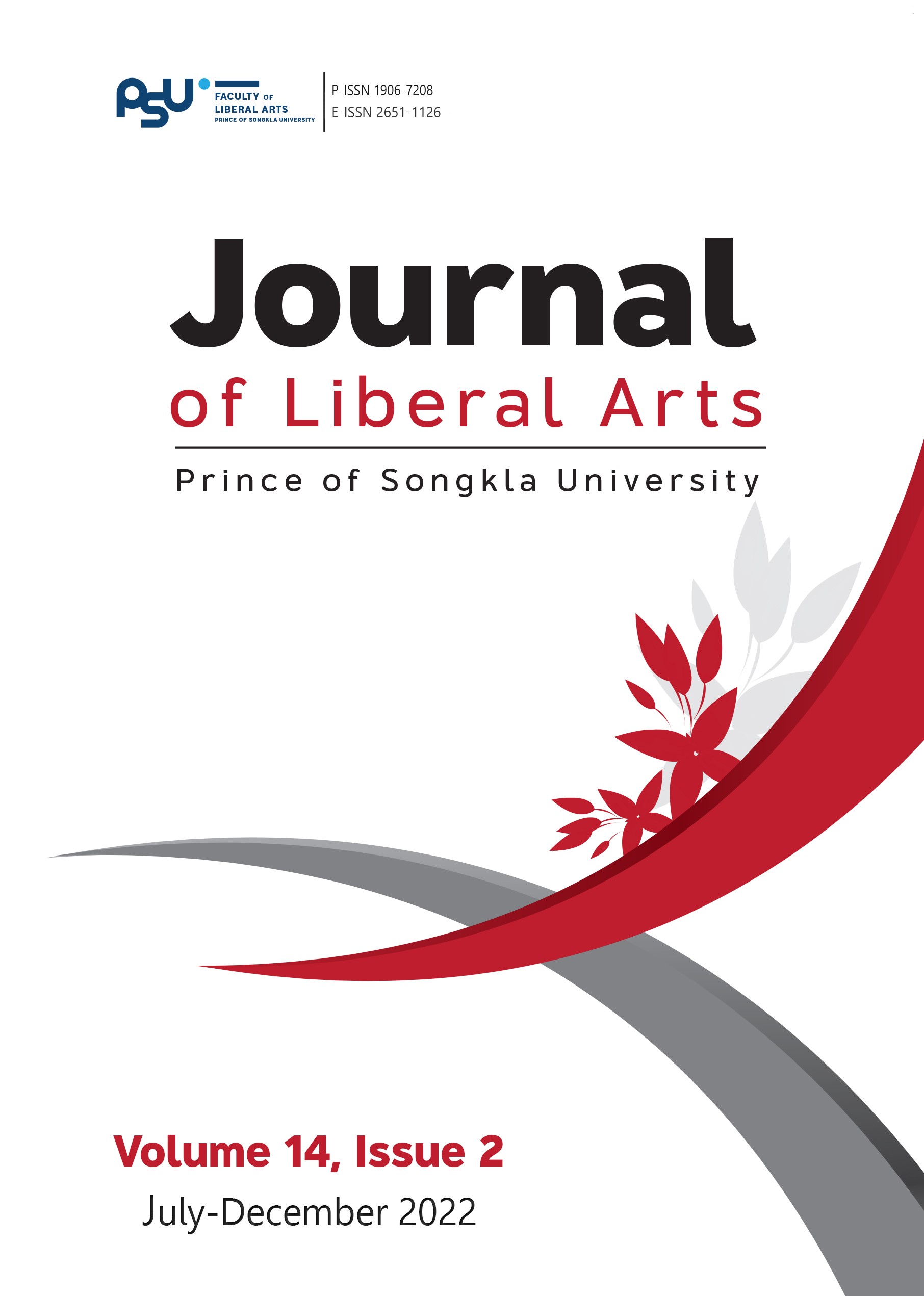A Comparison of Translation Techniques in Translating English Personal Pronouns into Thai: A Case Study of Little Lord Fauntleroy
DOI:
https://doi.org/10.14456/jlapsu.2022.16Keywords:
personal pronouns, translation techniques, translation factors, cross-cultural communicationAbstract
This research aims to compare the personal pronouns translation techniques used in translating the original English literature, Little Lord Fauntleroy, written by Frances Hodson which is translated by three Thai translators: Nawanak, Kaewkhamthip Chai, and Nengnoi Sattha. The data analyzed in this paper was collected from the translation of the narration and the dialogue of the characters. Baker’s framework (2018) was used as a criterion. 12 techniques were found in translating English pronouns to Thai. They are 1) the use of pronouns, 2) omission of personal pronouns, 3) the use of kinship terms, 4) the use of nouns or noun phrases, 5) the use of occupation terms, 6) the use of personal names, 7) the use of demonstratives, 8) inference, 9) the use of the antecedent, 10) the use of numbers, 11) the use of cultural words, and 12) the use of common nouns. The factors influencing translation techniques are grammatical features, such as number, and cultural factors, such as seniority, characters’ relationships, and speech situation.
References
Baker, M. (2018). In Other Words: A Coursebook on Translation. Routledge.
Burnett, F. H. (1887). Little Lord Fauntleroy. Charles Scribner’s Sons.
Chai, K. (2012). Chaonoifontoenroi. Khlassik. [in Thai]
Chandharath, W. (2013). The Relationship between Linguistic Honorifics and the Cognitive Systems of Japanese, Thai, and English Speakers [Master’s thesis, Chulalongkorn University]. CUIR. http://cuir.car.chula.ac.th/bitstream/123456789/43107/1/
pdf . [in Thai]
Hatim, B., & Mason, I. (1998). Discourse and the Translator. Addison Wesley Longman.
Larson, M. L. (1998). Meaning-Based Translation: A Guide to Cross-Language Equivalence. University Press of America.
Nawanak. (1968). Mataekrayangan. Odeonbookstore. [in Thai]
Netsuksang, S. (2019). Referring Expressions and Representations of Time in Thai and English Versions of Novel: A Case Study of The Happiness of Kati [Master’s thesis, Thammasat University]. TU Library. https://digital.library. tu.ac.th/tu
_dc/frontend/Info/item/dc:165663 [in Thai]
Panich, R. (2016). A Comparison Study of Deixis in English and Thai in the Literature Translation of J.K. Rowling’s Harry Potter. [Doctoral dissertation, Naresuan University]. EBSCO. https://eds.s.ebscohost.com/eds/detail/detail?vid=1&sid=29f55105-8634-4fad-b928eb6389a8d445%40redis&bdata=JkF1dGhUeXBlPXNzbyZzaXRlPWVkcy1saXZl#AN=nur.390274&db=cat07210a [in Thai]
Prasitthrathsint, A. (2005). Language in Thai Society: Diversity, Change, and Development. Chulalongkorn University Press.
[in Thai]
Prasitthrathsint, A. (2007). Sociolinguistics. Chulalongkorn University Press. [in Thai]
Pinmanee, S. (2014). Advanced Translation. Chulalongkorn University Press. [in Thai]
Pokasamrit, P. (2011). Pronoun Translation from English into Thai. Journal of the Faculty of Arts, Silapakorn University, 33(2), 57-88. [in Thai].
Royal Academy. (2013). Royal Institute dictionary (2011 edition). Nanmeebooks Publications. [in Thai]
Ruangsri, S. (2018). Translation of Personal Reference Terms in Japanese Novels Translated into Thai. JSN (Journal Special Edition), 8(3), 116-130. [in Thai].
Sattha, N. (2012). Lotnoifontoenroi. Praew Juvenile. [in Thai]
Thamasorn, P. (2001). A Comparative Study of the Pronoun System in the “1971” and the “Easy-to-Read” Bible Translation [Master’s thesis, Chulalongkorn University]. TDC. https://tdc.thailis.or.th/tdc/BrowseCreatorDataTable.php?CreatorName=%E2%BB%C3%B4%BB%C3%D2%B9%20%B8%C3%C3%C1%CA%CD%B9 [in Thai]
Thongdee, S. (2005). Translation of Personal Pronouns in George Sand’ Rustic Novel “La Mare Au Diable”. [Master’s thesis, Chulalongkorn University]. CUIR. http://cuir.car.chula. ac.th/handle/123456789/7002. [in Thai]
Wachirapansakul, N. (2002). Chit Phumisak’s Translation of Address Terms and Pronouns in the Translated Version of “He Who Rides a Tiger”. [Master’s thesis, Mahidol University].
Digital Research Information Center .https://dric.nrct.go.th/index. php?/Search/SearchDetail/124275 . [in Thai]
Yannajan, K. and Srichat, S. (2017). The Pronouns Translation in Different contexts of Short Stories from English into Thai. RMUTSB ACADEMIC JOURNAL (HUMANITIES AND SOCIAL SCIENCES), 2(2), 168-178. [in Thai]
Downloads
Published
How to Cite
Issue
Section
License
Copyright (c) 2022 Ruethai Panich

This work is licensed under a Creative Commons Attribution-NonCommercial-NoDerivatives 4.0 International License.
The authors retain the copyright to their article but the Journal of Liberal Arts, Prince of Songkla University reserves the exclusive rights to first publication.






